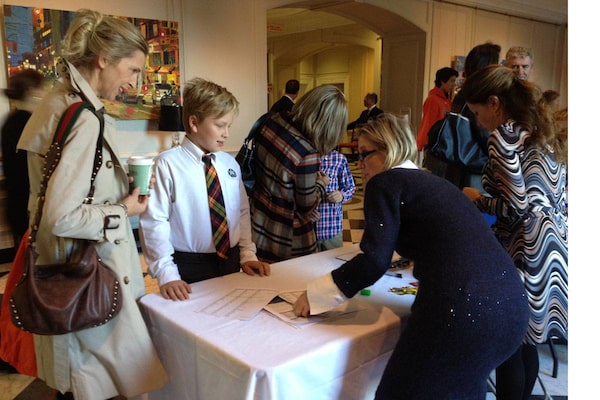
The orientation event at Upper Canada College in Toronto allows parents to get some of their questions answered.
The brochures are read, the websites scoured. The school has a good reputation and, importantly, your child is keen to attend. The tuition is doable and you've spoken to other parents.
Now it's time to ask the school your burning questions. What is it that parents are most concerned about?
"The main concerns when they come to me are: Will you know my daughter? How will the school know my child, and how will they help my child find purpose?" says Katherine Nikidis, head of the Trafalgar School for Girls in Montreal.
A school's academics are, of course, paramount, along with the standard of its extracurriculars, from student clubs and sports, to arts and community service. But even the schools themselves acknowledge that most private schools, as well as public ones, do a terrific job with most of these criteria. The difference is in the learning environment.
"I would say the more savvy parent is focused on the here and now," Ms. Nikidis says, and by this she means a parent should not be solely focused on the end goal of getting the child into a great university. Instead, it is important a parent appreciate the process and the child's experiences at each stage.
For instance, Ms. Nikidis notes her school offers each girl a learning and growth plan.
"So we work on everything, from a plan for academics, but also what enrichment are we giving them, what opportunities."
This allows the school to offer students both support and enrichment where it is needed, she says.
Other principals also stress that a nurturing, approach is at the top of parents' minds. Yet, finding the words to ask about this can be elusive.
"Parents will come in, and they'll have a list on one side of their minds, on academics, athletics and the arts and a commitment to service, what we call the pillars here. But I really think what they're looking for is a vibrant community," says Steven Laffoley, headmaster of the Halifax Grammar School.
"So they are looking for a philosophical fit, getting a sense of fun, purpose, commitment to something that's greater than the sum of its parts. It's the intangible that says in the end: This is where I want to go," he says.
That individualized approach also works at schools that fill a particular niche, such as the Catholic private school Little Flower Academy in Vancouver, attracting families who want to make sure the specialized education can still satisfy a child's specific interests.
Being a small school, Little Flower doesn't offer French immersion, for instance. Many students will come with an immersion background. "So there will be specific programmatic questions in that regard. We have a path for them, but it's not an immersion path," says Ben Fitch, director of advancement at Little Flower.
The school will instead put the student on an advanced placement track for the subjects in which she is strong, allowing her to take them at a higher grade level, provided the student chooses to continue along that advanced path. Again, it's about getting to know the student closely and customizing her educational route.
Sam McKinney, principal of Upper Canada College in Toronto, believes that so much can be learned in the simplest way of all: by visiting the school, looking at the physical space, and imagining your child studying there.
"Often I've said to them [to the parents], 'Look in the classroom, and picture a chair in that room. Picture your child in that chair. Does that make you feel good, seeing your child in that classroom, in that learning environment?' It's almost down to a feeling as opposed to a question that guides decision making in many respects," Mr. McKinney says.
He echoes the question many principals note: "Will this school know my child as a unique individual, with their own skills and abilities? That's the question which for me matters most," he said. "Because if there's one truth, I know that we have 1,170-odd boys in Upper Canada College that are attending this year, but they are all unique individuals. I know that learning occurs best when those individuals are known uniquely and well by their teachers."
Some questions to ask
Classroom
What is the classroom layout and learning environment? Most importantly, visit the classroom, and picture your child there, sitting at that desk.
Teachers
How diverse is the teaching staff? Teachers with different attributes, genders and backgrounds add to a child's breadth of learning.
Supports
What extra support is available (if a child is struggling a little with a subject), as well as advanced placement possibilities (if the child excels in an area)?
How will student counsellors or advisors help in planning your child's classes and educational path throughout their time at the school?
Intangibles
And perhaps most crucially, ask about the intangibles, such as a family-type spirit at the school, and the involvement of alumni.